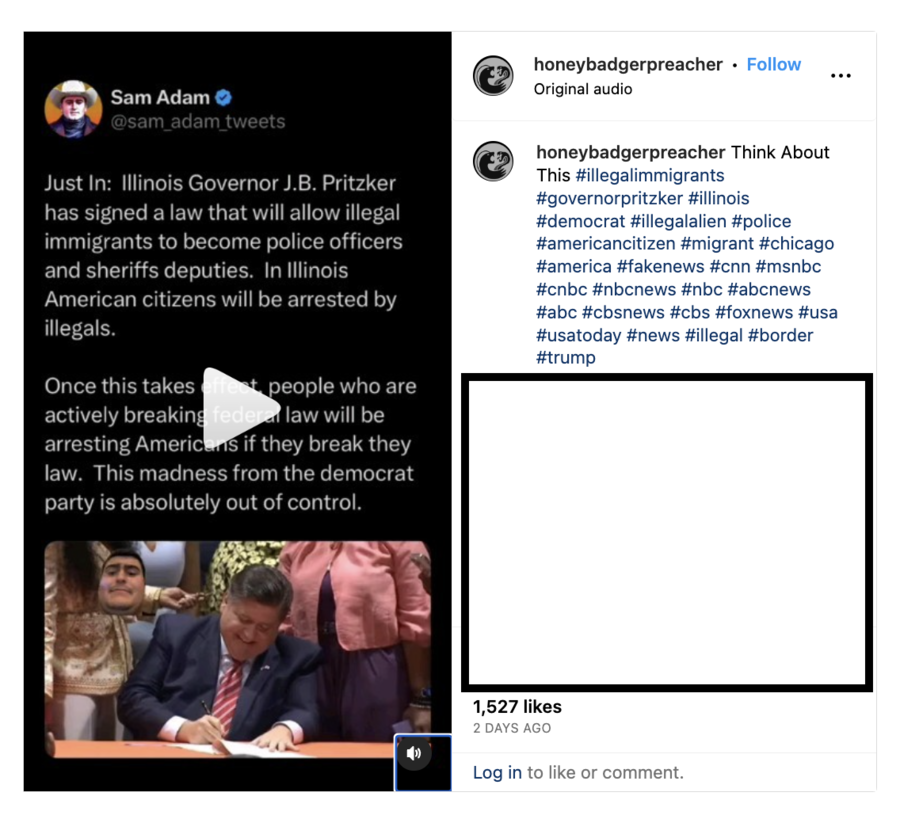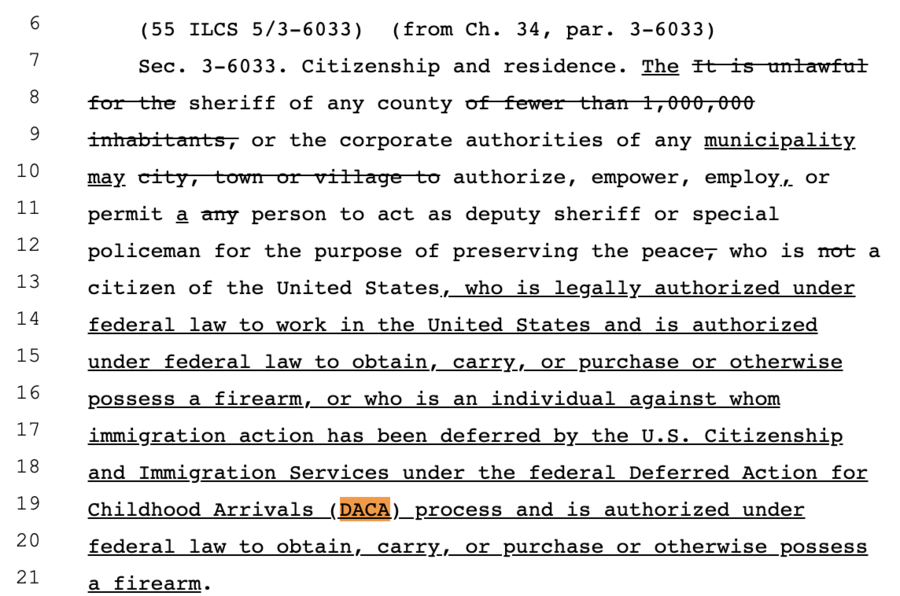
Did Illinois Gov. Jay Robert "J.B." Pritzker sign a law that will allow "illegal immigrants" to become police officers and sheriffs' deputies? No, that's not true: Neither DACA recipients nor lawful permanent residents -- the two categories of noncitizens who were allowed to join law enforcement under the new law -- are in the United States as "illegal" immigrants. Unlike lawful permanent residents, however, DACA recipients, given their unique position within the immigration system, are treated differently for different purposes. The existing federal gun legislation prevents them from possessing a gun, which constitutes a major obstacle to joining the police, and the Illinois law does not change it. A bill's co-sponsor described this part of the state legislation to Lead Stories as symbolic.
The claim appeared in a post on Instagram on July 29, 2023. It opened:
Think About This #illegalimmigrants #governorpritzker #illinois #democrat #illegalalien #police #americancitizen #migrant #chicago #america #fakenews #cnn #msnbc #cnbc #nbcnews #nbc #abcnews #abc #cbsnews #cbs #foxnews #usa #usatoday #news #illegal #border #trump
The entry contained what appeared to be a screenshot of a tweet, saying:
Just In: Illinois Governor J.B. Pritzker has signed a law that will allow illegal immigrants to become police officers and sheriffs deputies. In Illinois American citizens will be arrested by illegals.
Once this takes effect, people who are actively breaking federal law will be arresting Americans if they break they law. This madness from the democrat party is absolutely out of control.
Here is what it looked like on Instagram at the time of writing:
(Source: Instagram screenshot taken on Aug 1 14:46:59 2023 UTC)
The Illinois bill HB3751 signed into law on July 28, 2023, changes the Illinois Municipal Code starting from January 1, 2024. The summary of the document reads:
Provides that an individual who is not a citizen but is legally authorized to work in the United States under federal law is authorized to apply for the position of police officer, subject to all requirements and limitations, other than citizenship, to which other applicants are subject.
But it only explicitly mentions one category of noncitizens: DACA (Deferred Action for Childhood Arrivals program) recipients.
The screenshot below demonstrates the changes in the wording compared to the previously existing legislation. It shows that no other group, except for DACA recipients, was named in the final version of the law, giving a broader definition that can be theoretically applicable to more than one category of noncitizens:
(Source: Ilga.gov screenshot taken on Mon Aug 7 19:06:39 2023 UTC)
On July 30, 2023, Florida Republican Gov. Ron DeSantis was among those who tweeted (archived here) that "Illinois is now letting illegal aliens become police officers."
On July 31, 2023, Pritzker clarified that the new law included not only DACA recipients but also lawful permanent residents, even though the full text of the law did not clearly name this category. During his press conference, the governor additionally refuted the claim on social media:
Undocumented immigrants are not allowed to become police officers in the state of Illinois still. What we have allowed is ... legal permanent residents and DACA recipients now to become police officers.
However, Lead Stories found that there are more nuances.
Police officers in the United States are typically required to carry a gun when on duty, and the State of Illinois is no exception, even though it is not explicitly mentioned in the pre-recruitment requirements.
A co-sponsor of the bill -- state Rep. Barbara Hernandez -- told Lead Stories via email on August 7, 2023:
The bill states that DACA recipients can apply to be officers as long as they have federal approval that they can carry, purchase guns. Since I do not see that happening any time soon, that portion of the bill is symbolic unless their own individual department finds ways to allow them.
Hernandez, a Democrat like Pritzker, pointed out that both versions of the bill had bipartisan support:
... all the Republican legislators voted on the first-vote version of the bill. Once the senate amended it we had 100 yes' and 7 no's (out of 118). MOST Republican legislators voted on this bill.
While the federal law does not prohibit noncitizens from obtaining a gun, it explicitly excludes the category described as "illegal aliens."
Recipients of DACA are those who were brought to the United States as minors during a specific period of time and received temporary, renewable protection from deportation. While the 2021 court ruling prohibits the immigration authorities from approving more initial DACA requests, the U.S. Citizenship and Immigration Services (USCIS) says that, as of August 2023, applications for renewal still can be processed.
DACA recipients can legally work in the United States, but do not have "a lawful status." This creates a lot of confusion for those who are not familiar with immigration law.
The USCIS website further explains this, noting that, in practice, the DACA time cannot be counted toward accumulating the period of lawful permanent residency required to become eligible to apply for U.S. citizenship, but this time is also not counted as an illegal stay that, if it exceeds a certain amount, typically makes a person inadmissible to the U.S.:
... although deferred action does not confer a lawful immigration status, you may stay in the United States while your deferred action is in effect. For admissibility purposes, you will not accrue 'unlawful presence' while you have deferred action. You are also considered to be 'lawfully present' in the United States while you have deferred action for purposes of certain public benefits (such as certain Social Security benefits) as described in 8 C.F.R. sec. 1.3(a)(4)(vi). Federal law does not prevent individuals granted deferred action from establishing domicile in the United States.
Yet, the immigration authorities explicitly say that DACA recipients cannot obtain or carry guns:
It is a federal crime for a noncitizen who is 'illegally or unlawfully in the United States,' among others, to ship or transport in interstate or foreign commerce, or possess in or affecting commerce, any firearm or ammunition, or to receive any firearm or ammunition which has been shipped or transported in interstate or foreign commerce. See 18 U.S. 922(g)(5)(A). This prohibition applies to DACA recipients.
A representative of Pritzker's office, Deputy Communications Director Kamaria Morris, told Lead Stories that the new law does not contradict federal gun ownership regulation:
Nothing in HB3751 (Public Act 103-0357) preempts federal law. If an individual is not authorized under federal law to obtain, carry, purchase, or possess a firearm, they cannot be hired/appointed to the law enforcement positions. The bill does not allow or deny DACA recipients the ability to carry firearms. DACA recipients would need to be authorized under federal law to obtain, carry, purchase, or possess a firearm. The drafters accounted for this issue when they added a clause into the bill that provided 'and is authorized under federal law to obtain, carry, or purchase or otherwise possess a firearm...'
In contrast, lawful permanent residents, also described as green card holders or resident aliens, do not face such restrictions and, thus, can legally obtain a gun if they meet other requirements.
As defined by the Department of Homeland Security, an immigrant is:
Any person lawfully in the United States who is not a U.S. citizen, U.S. national, or person admitted under a nonimmigrant category as defined by the INA Section 101(a)(15).
As of August 7, 2023, being a U.S. citizen was listed among the major prerecruitment requirements to become a police officer in the State of Illinois. Lead Stories reached out to the state police, but its representative referred the questions to the Governor's Office.
In February 2023, Lead Stories reported that "illegal immigrants" cannot become police officers in California.
Other Lead Stories fact checks about immigrants can be found here.



















